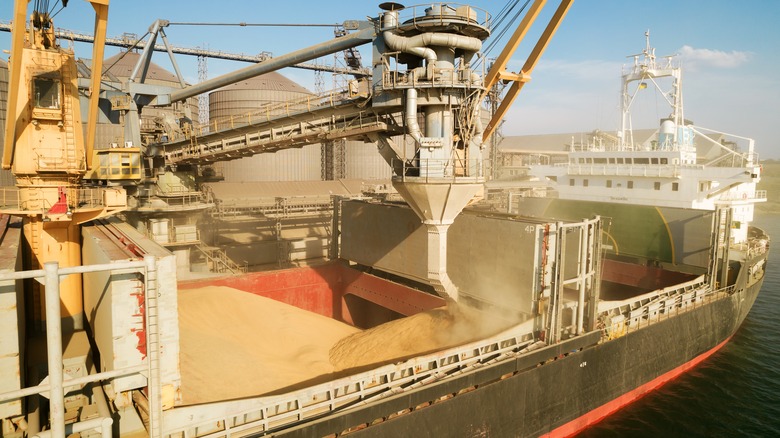Here's How Much The War Affected Ukraine's Grain Exports
The first grain shipment to be protected under the Russian-Ukrainian grain deal reached port in Istanbul yesterday. According to Reuters, the ship, Sormovsky, transported 3,050 metric tons of wheat from the Ukrainian port Chornomorsk. This marks the first wheat to leave the country since Russia first invaded on February 24.
PBS explains that the importance of this ship is due to the position Ukraine occupies in the global supply chain. The Russian blockade of the country has contributed to wheat prices skyrocketing. More importantly, the blockade also reduced the amount of wheat that would reach nations in Africa, Asia, and the Middle East. This shortage was exacerbated by a drought in Somalia, Kenya, and Ethiopia. When the wheat shipments first left Ukraine in the beginning of August, Insider reported that prices began to fall. Many hoped that these shipments would mark a return to some level of food normalcy.
Calculating the loss
Almost six months have passed since Russia initiated the invasion. Now data about the damage it has done to the wheat market has come in. Reuters learned from Ukraine's agricultural ministry that grain exports were 46% lower than they were last year. The country has only exported 2.65 million tonnes of grain as opposed to the 4.85 million tonnes it managed last year. Comparing exports in the Augusts of 2021 and 2022, the ministry stated that with the deal, 948,000 tonnes of grain were exported in the first half while the same period saw 1.88 million tonnes leave in the same time last year.
Looking ahead, forecasts were low as well. The government projects a possible harvest of 50 million tonnes. Last year, a record harvest of 86 million tonnes was taken in. But between the invasion reducing the harvestable land and lowering grain yields, this number is not possible this year. However, one forecast is relatively rosier. The Guardian reported that since the onset of the invasion the number of people facing acute food insecurity rose to 69 million. With the first grain-bearing ships leaving Ukraine, we can expect that number to decrease.

